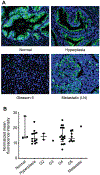GNRH2 Polymorphism in Men With Prostate Cancer Treated With Androgen Deprivation Therapy
- PMID: 37648321
- PMCID: PMC10760530
- DOI: 10.21873/anticanres.16590
GNRH2 Polymorphism in Men With Prostate Cancer Treated With Androgen Deprivation Therapy
Abstract
Background/aim: Gonadotropin-releasing hormone 2 (GNRH2) is a poorly-studied peptide hormone that is widely distributed in the central nervous system and expressed in peripheral tissues of mammals. The non-synonymous rs6051545 variant in GNRH2 (A16V) has been linked to higher serum testosterone concentrations. This study investigated whether the A16V variant is associated with altered androgen-deprivation therapy (ADT) progression-free survival (PFS) and overall survival (OS).
Patients and methods: We examined the expression of GNRH2 in prostate tissue microarrays comprising normal tissue, prostatic hyperplasia, and prostate cancer using immunofluorescence. We also evaluated the GNRH2 genotype in 131 patients with prostate cancer who received ADT and compared PFS and OS between the variant and wild-type genotypes.
Results: GNRH2 was detected in all prostate tissues, although expression did not vary with Gleason grade or disease stage (p=0.71). The GNRH2 A16V genotype was not associated with PFS or OS; however, univariate and multivariate analyses revealed Gleason score and definitive local therapy were each associated with PFS (p≤0.0074), whereas age and Gleason score were associated with OS (p≤0.0046).
Conclusion: GNRH2 is expressed in normal, hyperplastic, and neoplastic prostate tissues; the A16V variant is not related to treatment outcome or survival.
Keywords: GNRH2; androgen deprivation therapy; prostate cancer; survival.
Copyright © 2023 International Institute of Anticancer Research (Dr. George J. Delinasios), All rights reserved.
Conflict of interest statement
Conflicts of Interest
The Authors declare no conflicts of interest in relation to this study.
Figures


Similar articles
-
The Association of Polymorphisms in the Gene Encoding Gonadotropin-Releasing Hormone with Serum Testosterone Level during Androgen Deprivation Therapy and Prognosis of Metastatic Prostate Cancer.J Urol. 2018 Mar;199(3):734-740. doi: 10.1016/j.juro.2017.09.076. Epub 2017 Sep 20. J Urol. 2018. PMID: 28941922
-
Abiraterone acetate in combination with androgen deprivation therapy compared to androgen deprivation therapy only for metastatic hormone-sensitive prostate cancer.Cochrane Database Syst Rev. 2020 Dec 12;12(12):CD013245. doi: 10.1002/14651858.CD013245.pub2. Cochrane Database Syst Rev. 2020. PMID: 33314020 Free PMC article.
-
Androgen Deprivation Therapy and Overall Survival for Gleason 8 Versus Gleason 9-10 Prostate Cancer.Eur Urol. 2019 Jan;75(1):35-41. doi: 10.1016/j.eururo.2018.08.033. Epub 2018 Oct 24. Eur Urol. 2019. PMID: 30554605
-
SLCO2B1 and SLCO1B3 may determine time to progression for patients receiving androgen deprivation therapy for prostate cancer.J Clin Oncol. 2011 Jun 20;29(18):2565-73. doi: 10.1200/JCO.2010.31.2405. Epub 2011 May 23. J Clin Oncol. 2011. PMID: 21606417 Free PMC article.
-
A Review on the Effects of Androgen Deprivation Therapy (ADT) on Bone Health Status in Men with Prostate Cancer.Endocr Metab Immune Disord Drug Targets. 2017 Nov 16;17(4):276-284. doi: 10.2174/1871530317666170919112757. Endocr Metab Immune Disord Drug Targets. 2017. PMID: 28925899 Review.
Cited by
-
Identification of biomarkers and potential drug targets for esophageal cancer: a Mendelian randomization study.Sci Rep. 2025 Mar 10;15(1):8176. doi: 10.1038/s41598-025-93068-4. Sci Rep. 2025. PMID: 40059241 Free PMC article.
-
Role of gonadotropin-releasing hormone 2 and its receptor in human reproductive cancers.Front Endocrinol (Lausanne). 2024 Jan 8;14:1341162. doi: 10.3389/fendo.2023.1341162. eCollection 2023. Front Endocrinol (Lausanne). 2024. PMID: 38260130 Free PMC article. Review.
References
MeSH terms
Substances
Grants and funding
LinkOut - more resources
Full Text Sources
Medical
